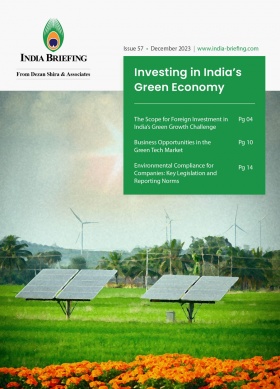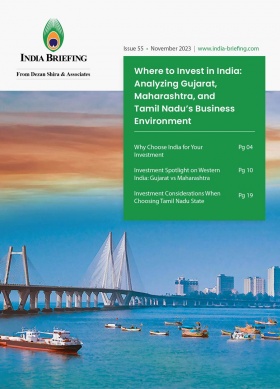India’s Food Processing Industry Sees Over INR 70 Billion in Investments Under PLI Scheme
India’s food processing industry’s growth is propelled by increased urbanization, a 15-fold expansion in domestic processing capacity since 2014, and efforts to modernize the agro-industry ecosystem, presenting opportunities for foreign investors and start-ups. The ongoing production-linked incentive program is expected to upgrade food processing infrastructure, attract technology to optimize farm-to-industry output, and boost exports. Major multinational companies present in this space include Kraft, Kellogg’s, Nestle, Mars, Del Monte, among others.
PLI scheme status
India’s food processing sector’s PLI scheme is currently in operation from the fiscal year (FY) 2021-22 to FY 2026-27, at a budget of INR 109 billion (US$1.30 billion). The initiative aims to encourage manufacturing in four specific categories: ready-to-cook and ready-to-eat products, processed fruits and vegetables, marine products, and mozzarella cheese. Additional objectives include endorsing innovative and organic products from small and medium-sized enterprises (SMEs) and providing incentives for branding and marketing initiatives abroad to promote Indian brands in the global market.
Per the latest information available, companies that have successfully applied to the scheme have made investments worth INR 71.26 billion in the food processing industry and generated cumulative sales worth INR 498.25 billion (US$5.97 billion) up until the April-September quarter this year. Incentives disbursed for FY 2022 amounted to INR 5.84 billion (US$70.04 million). According to food processing PLI scheme guidelines, beneficiaries are required to furnish incentive claims for a specific financial year by December 31 in the following financial year.
The PLI scheme’s quarterly report indicates that 237,335 persons were employed by PLI beneficiaries as of September 30, 2023.
Investment outlook of the food processing industry
With the rapid take-off in urbanization, the demand for ready-to-eat and packaged food has increased. India is hoping to modernize the agro-industry ecosystem so that changing consumer habits create a pipeline of benefits for farmers, start-ups, and SME businesses.
Food processing is considered a ‘sunrise sector’ in India and has attracted foreign direct investment (FDI) worth INR 500 billion (US$5.99 billion) in the last nine years. Exports of processed food have grown by 150 percent.
The food processing industry’s contribution to agricultural exports is now 23 percent, growing from 13 percent in 2014. India’s agricultural and processed food exports amounted to US$51 billion in 2022-23, ranking seventh worldwide.
By 2025, India’s food processing market is expected to grow to US$535 billion at a compound annual growth rate of 15.2 percent. Tier-2 and tier-3 cities are key consumer markets for FMCG businesses, as they are mirroring consumption trends in metropolitan cities.
In November this year, the Ministry of Food Processing Industries (MoFPI) organized the second edition of World Food India. For the 2023 event, Japan was the focus country and the Netherlands was the partner country; both hosted knowledge sessions on best practices. Key subjects discussed included financial empowerment, quality assurance, innovations in machinery and technology, e-commerce, and logistics in the food processing sector. Memoranda of understanding (MoUs) worth INR 331.29 billion (US$3.97 billion) were signed with companies such as Mondelez India, General Mills, Innobev, Amul, ITC, Kellogg’s, AB InBev, IB Group, Balaji Wafers, Nedspice, Ananda Dairy, Fertis, and Bikanerwala as signatories. Over 70 CEOs representing leading companies in the food processing and allied sectors attended the event.
Read: Key Considerations Before Selling Foreign Products in India
FDI rules
Hundred percent FDI is authorized automatically in the food processing industry in India. Also, 100 percent FDI is permissible through the government approval route for trading, including e-commerce, specifically for food products manufactured or produced within India.
India is the second largest producer of fruits and vegetables and is a global leader in the production of a variety of fruits like mango, banana, guava, papaya, sapota, pomegranate, lime, and aonla.
Besides manufacturing food products, India is seeking technology and capital investments towards solutions to reduce post-harvest losses and sustainable packaging, creating opportunities for foreign investors and start-up entrepreneurs.
Domestic infrastructure
Since 2014, India’s domestic processing capacity has grown 15 times to reach 20 million metric tonnes.
There are more than 20 operational mega food parks, 371 cold chain projects, and 68 agro-processing clusters.
According to the country’s investment facilitation agency Invest India, 474 proposals under the Creation/Expansion of Food Processing & Preservation Capacities (CEFPPC), 61 backward and forward linkages projects, 46 Operation Green projects, and 186 food testing Laboratories projects have been approved.
Mega food parks
India implemented the Mega Food Park Scheme (MFPS) until April 2021, under which it approved 41 projects. Of these, 24 are operational as of December 2023. The goal of this scheme is to create modern infrastructure for the food processing sector along the value chain from farm to market.
|
Mega Food Parks in India |
||
|
S. No. |
Food park |
Location |
|
1. |
Srini Mega Food Park |
Chittoor, Andhra Pradesh |
|
2. |
Godavari Mega Aqua Park |
West Godavari, Andhra Pradesh |
|
3. |
North East Mega Food Park |
Nalbari, Assam |
|
4. |
Indus Best Mega Food Park |
Raipur, Chhattisgarh |
|
5. |
Gujarat Agro Mega Food Park |
Surat, Gujarat |
|
6. |
Cremica Mega Food Park |
Una, Himachal Pradesh |
|
7. |
Integrated Mega Food Park |
Tumkur, Karnataka |
|
8. |
Kerala Industrial Infrastructure Development Corporation (KINFRA) Mega Food Park |
Palakkad, Kerala |
|
9. |
Indus Mega Food Park |
Khargoan, Madhya Pradesh |
|
10. |
Avantee Mega Food Park |
Dewas, Madhya Pradesh |
|
11. |
Paithan Mega Food Park |
Aurangabad, Maharashtra |
|
12. |
Satara Mega Food Park |
Satara, Maharashtra |
|
13. |
Zoram Mega Food Park |
Kolasib, Mizoram |
|
14. |
MITS Mega Food Park |
Rayagada, Odisha |
|
15. |
International Mega Food Park |
Fazilka, Punjab |
|
16. |
Sukhjit Mega Food Park |
Kapurthala, Punjab |
|
17. |
Greentech Mega Food Park |
Ajmer, Rajasthan |
|
18. |
Smart Agro Mega Food Park |
Nizamabad, Telangana |
|
19. |
Tripura Mega Food Park |
West Tripura, Tripura |
|
20. |
Patanjali Food and Herbal Park |
Haridwar, Uttarakhand |
|
21. |
Himalayan Mega Food Park |
Udham Singh Nagar, Uttarakhand |
|
22. |
Jangipur Bengal Mega Food Park |
Murshidabad, West Bengal |
|
23. |
Haryana State Industrial and Infrastructure Development Corporation Ltd (HSIIDC) |
Sonipat, Haryana |
|
24. |
Kerala State Industrial Dev Corpt Ltd (KSIDC) |
Alappuzha, Kerala |
Fiscal incentives for the food processing industry
Goods and services tax (GST)
|
Tax slabs |
Products |
|
0% & 5% |
60% of food products |
|
Nil |
Milk, milk products (Butter milk, Curd, un-branded Paneer), Meat, Fish, vegetables, nuts, fruits |
|
12% |
Condensed milk |
|
5% |
UHT Milk |
|
Nil |
Services of pre-conditioning, pre-cooling, ripening, waxing, retail packing, labeling of fruits and vegetables that do not alter their essential characteristics |
|
18% |
Refrigeration machinery and parts for cold storage, cold room, or refrigerated vehicles used in the preservation, storage, transport, or processing of agricultural, apiary, horticultural, dairy, poultry, aquatic, and marine produce, and meat |
|
12% |
Machinery used in the dairy sector |
|
18% |
Machinery for the preparation of meat, poultry, fruits, nuts, or vegetables; presses, crushers, and similar machinery used in the manufacture of wine, cider, fruit juices, or similar beverages |
|
28% |
Aerated water, including mineral waters, containing added sugar, sweetening matter, flavored, Molasses & Pan Masala |
Income tax incentives
- Food processing units are eligible for a 100 percent profit exemption for the initial five years, followed by a 25 percent deduction (30 percent for companies) for the subsequent five years.
- A full deduction, equivalent to 100 percent, is allowed for capital expenditure related to cold chain or warehouse investments.
Credit facilities
- Loans provided to food & agro-based processing units and cold chain have been categorized under agriculture activities for priority sector lending (PSL).
- Capital investments aimed at establishing modern storage capacity are now eligible for the Viability Gap Funding scheme offered by the Finance Ministry. Cold chain and post-harvest storage have been acknowledged as a distinct infrastructure sub-sector.
- An exclusive food processing fund amounting to US$263 million (INR 20 billion) has been established under the National Bank for Agriculture and Rural Development (NABARD). This fund is dedicated to offering affordable credit to Mega Food Parks (MFPs) and units set up under MFPs and designated food parks.
Aspiration to be the global hub for millet
This year, 2023, has been heavily promoted by India as the International Year of the Millet, featuring on the G20 Summit agenda, and showcasing the country’s millet-based food products. Millets, a nutritious cereal crop, is considered part of the ‘superfoods’ basket.
India exported millets worth US$75.46 million in the year 2022-23, against US$62.95 million in 2021-22. However, the share of millet-based value added products was negligible, per industry body APEDA. This is an area of focus for the Indian government. India is the largest producer of millet, followed by Niger and China. The main millet-growing states in India are Rajasthan, Maharashtra, Karnataka, Andhra Pradesh, and Madhya Pradesh.
Interestingly, Chinese technology giant Lenovo has set up a digital center at the Institute of Human Resources Development (IHRD) College for Applied Sciences in Kanthalloor, Kerala, which will facilitate access to technology tools for the revival of six millet varieties in Kerala. The six millet varieties are finger millet, barnyard millet, little millet, foxtail millet, proso millet, and kodo millet.
Lenovo’s decision comes under its Work for Humankind Initiative. In collaboration with Samudra Network and Agri App, Lenovo is working to digitize the agricultural value chain for millet in the area, which includes tracking crop details, digitizing processing operations to ensure quality control, and creating a market catalog for millet products.
While such corporate social responsibility (CSR) initiatives may not be remarkably new, they indicate how global multinationals are seeking to align with India’s governmental goals and development aims to create a more market-friendly position. Per latest data, the Chinese electronics major is among the top two in India’s PC market and will be able to tap PLI benefits under a difference scheme via Indian contract manufacturer Padget Electronics, a subsidiary of Dixon Technologies.
Foreign investor prospects
The foreign investment prospects in India’s food processing industry are buoyant, driven by favorable policies, a large consumer market, and government initiatives aimed at enhancing the sector’s competitiveness and sustainability.
Prominent multinational companies invested in India’s food processing industry are Kraft, Mars, Nestle, McCain, Danone, Ferrero, Del Monte, Kagome, Kellogg’s, Pepsi, Coca Cola, Unilever, Perfetti van Melle, Cargill, Hershey’s, Yakult, Amazon, ITC, Britannia, etc.
India’s food processing industry presents promising prospects for foreign investments due to several factors:
- Liberalized FDI policies: India allows 100 percent FDI in the food processing sector under the automatic route, facilitating a straightforward and efficient investment process.
- Growing consumer base: With a population exceeding a billion people, and rapid pace of urbanization, India provides a vast and growing consumer market for processed food products.
- Rising disposable income: Increasing disposable income among the middle-class population is driving a shift in consumer preferences towards processed and convenience foods.
- Government initiatives: The Indian government has introduced initiatives, such as the PLI scheme, offering incentives and exemptions to encourage investment in manufacturing and sales of Indian products, and boost the sector’s overall growth. Tax and other fiscal incentives are also on offer, besides any state-wise preferential treatment.
- Export opportunities: The agro-export sector has witnessed a surge in exports of processed food products, with India becoming a significant player in the global market. The government’s focus on promoting exports further enhances investment appeal.
- Technological advancements: There is a growing emphasis on incorporating advanced technologies in the food processing industry, providing opportunities for investments in automation, quality control, and sustainable practices.
- Infrastructure development: Investments in infrastructure, including cold chains, storage facilities, and transportation networks, are crucial for the food processing industry. This presents avenues for foreign investors to contribute to the development of this infrastructure.
- International collaborations: The industry is open to collaborations and partnerships with foreign companies, fostering technology transfer, knowledge exchange, and market expansion.
- Focus on healthy and organic products: The increasing awareness of health and wellness is driving demand for healthier food options, creating opportunities for investments in the production of organic and health-focused processed foods.
- Government support for Mega Food Parks: The establishment of Mega Food Parks with state-of-the-art infrastructure and facilities, supported by government initiatives, provides an attractive investment environment.
About Us
India Briefing is produced by Dezan Shira & Associates. The firm assists foreign investors throughout Asia from offices across the world, including in Delhi and Mumbai. Readers may write to india@dezshira.com for more support on doing business in India.
We also maintain offices or have alliance partners assisting foreign investors in Indonesia, Singapore, Vietnam, Philippines, Malaysia, Thailand, Italy, Germany, and the United States, in addition to practices in Bangladesh and Russia.
- Previous Article Investing in India’s Green Economy – New Publication Out Now
- Next Article El sector de los vehículos eléctricos en la India: Capacidad de producción, objetivos gubernamentales y comportamiento del mercado








